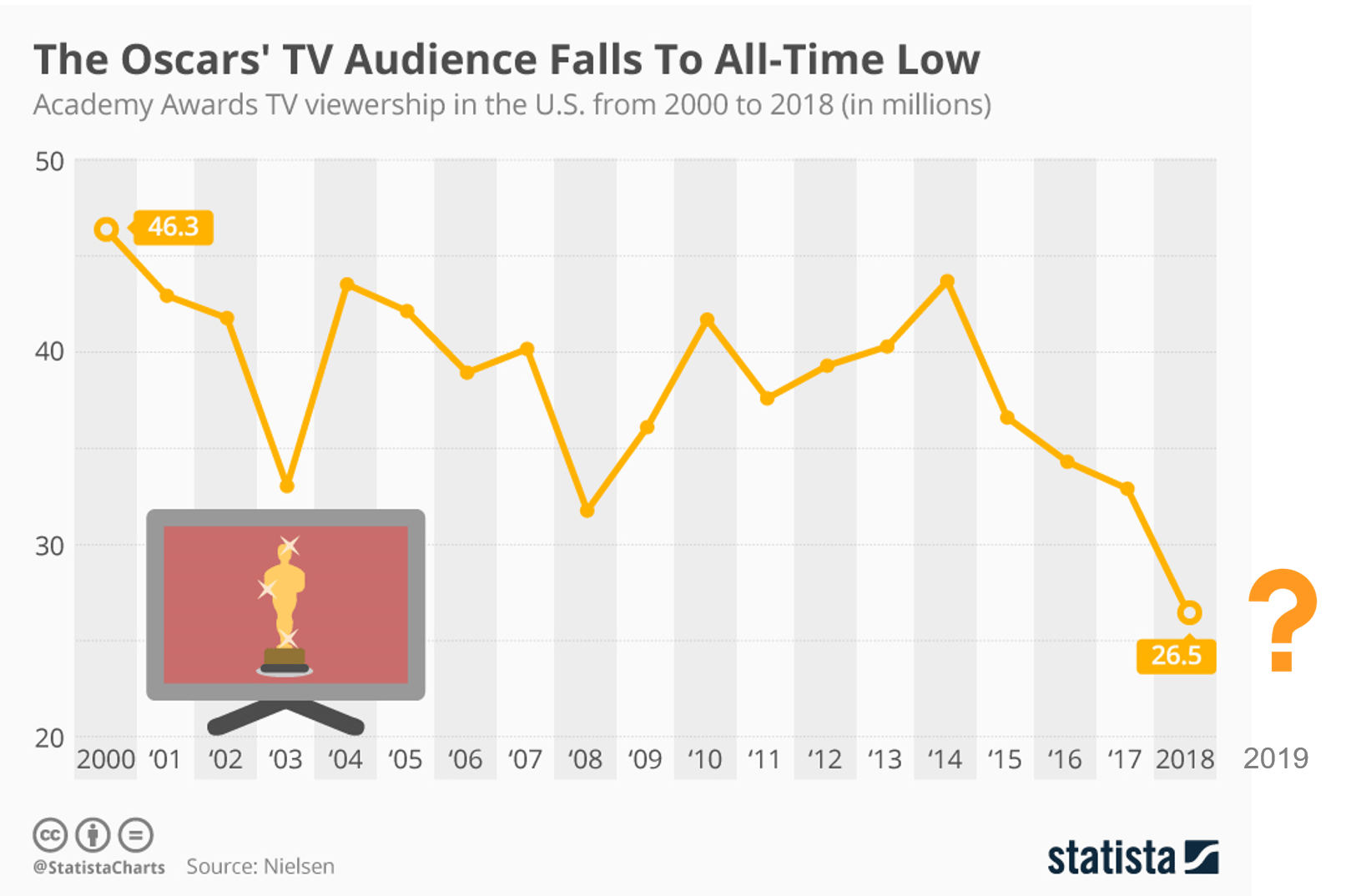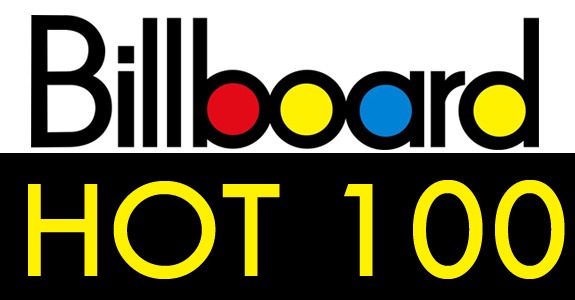 The movie industry has been hard-pressed in recent years to win over the America public, increasingly comfortable with sitting at home in their comfortable media rooms, watching a seemingly endless supply of shows, series, documentaries, and movies on Netflix.
The movie industry has been hard-pressed in recent years to win over the America public, increasingly comfortable with sitting at home in their comfortable media rooms, watching a seemingly endless supply of shows, series, documentaries, and movies on Netflix.
Who would be surprised to see another “meh” audience response for the Oscars this coming Sunday night, as well as mediocre ratings? The movie industry is going through more than just a tough patch.
The chart below from Statista shows the downward trajectory of Oscar night ratings. If you were the PD of this show, you likely would have been shown the door years go.

These days, it’s all about what’s on television. The biggest stars and some of the most compelling and entertaining content is readily available on TV. Consider the Netflix film released late last year, “Bird Box” starring Sandra Bullock, drew a TV audience larger than any motion picture released in the theaters last year.
And there’s no end in sight. More than 500 scripted shows were created and produced in 2018 by the three broadcast networks, cable channels, premium channels, and of course, streaming on-demand platforms that include Netflix, Hulu, and Amazon Prime – and a growing cast of others.
If you’re in the movie business, you’ve got pick and choose more carefully than ever before, learning your lessons from hits and misses – the films that have stiffed as well as those that managed to beat the odds and turn a big profit.
This past year, “Bohemian Rhapsody” had to be the standout. Whether it takes home a gold statuette or two this Sunday or not, the story of Queen and Freddie Mercury has become the most successful music biopic of all time. And as is always the case in the film industry, studios, producers, and writers have taken note.
Later this year, the next in what is becoming a its own genre, “Rocketman” will be released, “based on a true fantasy” about Elton John. Played by Taron Egerton (“Kingsmen”), the talented actor plays the role of Elton – and actually sings the songs featured in the film.
Not every one of these music biopics will enjoy the same success as the Queen film, but there are some great stories yet to be told in the annals of Classic Rock. And on the big screen, they can become like “Behind the Music” on steroids.
Here’s the trailer for “Rocketman.”
As interesting as “Rocketman” looks, I was recently taken by a trailer for a new film set for release early this summer – “Yesterday.”
It is tag-teamed by a star director/writer duo – Danny Boyle (“Slumdog Millionaire”) and Richard Curtis (“Love Actually”), so it’s got a good pedigree for a hit Rom Com.
And like a lot of plots these days, it falls in the “What if?” category. On the serious side, a number of you have probably seen “Man In High Castle” on Netflix which is all about what America would be like if the Japanese and Germans had won World War II.
Steven King’s novel, “11.22.63” was adapted into a what if Hulu film, reimagining James Franco going back in time to thwart the assassination of J.F.K.
“Yesterday” looks to be a fun, sweet film based on this bizarre premise: What if there was only ONE person on earth who remembered the Beatles?
Here’s the 3 minute trailer (which seemingly gives away much of the film’s plot) that frames up this what if fantasy.
None of us can predict whether “Yesterday” and other twists on these Classic Rock themes will enjoy the success of “Bohemian Rhapsody.”
But there will be more attempts leveraged on the power and mass appeal of the music. And lest you think these films are geared toward the aging Baby Boomers who grew up with the Fab Four, think again.
A new research abstract suggests there’s evidence to support the notion these types of films will attract a much broader audience – well, beyond, say, Beatles fans. The recently published study – “Who remembers the Beatles? The collective memory for popular music” used sophisticated research techniques to investigate recognition of music by generations across decades.
Among the questions the researchers tackled: What are the songs that stand out and are recalled by consumers of all ages? What eras are most memorable? And what role might streaming have in familiarizing songs to consumers?
The study was recently conducted by an NYU research team among 643 New Yorkers, and used Billboard charts to randomly select two of the top songs from each year during the span of 1940-2015. The researchers also attempted to correlate whether Spotify airplay of these songs might affect recall. Like a radio station music test, the researchers played respondents song hooks to measure familiarity and recognition. 
Among other findings, the one that jumps off the page is that Millennials are more apt to recall music from 1960-1990, rather than the songs they grew up with here in the 21st century.
This idea that music from the past – songs that were written and recorded even before they were born – generates more recognition among Millennials than some of the biggest hits of the past several years is a big takeaway. And Spotify streaming patterns seem to have very little to do with the recall of hit songs from various eras.
How do the researchers explain this phenomenon? After exhausting scientific rationales for the recall of older music, they drew this conclusion:
“Taken together, the most compelling interpretation supported by our data is the notion that the period from the 1960s to the 1990s was a special time in popular music history. During this period, we observe an extended plateau characterized by relatively high recognition that is surprising given prior research on collective memory.”
The researchers add that in order to determine whether music from this era was “truly special,” a follow-up in another 30 years or so.
I can save them the time, the expense, and the trouble.
Music from this era was spectacularly good, and that’s an understatement. And that goes a long way toward explaining why it has connected with a mainstream audience of all ages and backgrounds – including many who were not alive when the music was released.
Last year, we witnessed something special. A lot of people of all generations saw “Bohemian Rhapsody” – and in the process, discovered Queen. The band has been a favorite among those who’ve listened to Classic Rock radio for decades now. But it took a hit movie to literally “break the band” again in 2018, exposing their music to new fans.
What, if anything, does this trend suggest for radio? Stations in the Classic Rock family should take note of the success of films like “Bohemian Rhapsody” (and perhaps a deluge to come), and  go beyond testing the same lists of 600 hooks every year. Go deeper on bands like Queen that suddenly find themselves exposed in mainstream culture – film, streaming, social media, and beyond.
go beyond testing the same lists of 600 hooks every year. Go deeper on bands like Queen that suddenly find themselves exposed in mainstream culture – film, streaming, social media, and beyond.
Anticipating how mass appeal films will perform prior to their release is a crap shoot. But without any data, my best guess is that Queen’s library on Spotify enjoyed a noticeable bump in streams last year.
Tie-ins with these films for the premieres or private showings are also a no-brainer, bringing a sense of “currency” to radio stations that musically have very little.
It’s hard to say whether every rock band will have its day in the sun – on the screen. It’s hard to imagine biopics for Judas Priest, Pat Benatar, or Thin Lizzy.
But a film about Pete Best, the Beatles one-time drummer who was fired and replaced by Ringo Starr shortly before the group made it big could be riveting.
Or a biopic about Norman Greenbaum – rock’s quintessential one-hit wonder for “Spirit In The Sky” – would likely be highly entertaining. There is no shortage of great stories from the history of Classic Rock, many of which could make successful films.
So, will we start hearing more Beatles songs everywhere this summer – and of course, on the radio?
Don’t bet against it.
A quicker and easier read on this study was published last week in The Daily Mail – “Millennials are better at identifying songs made in the 1960s than they are at recognising tunes made today.” You can access it here.
And I promised a follow-up to our “Radio’s Transition to Digital: Like Turning The Queen Mary” post last week. It runs tomorrow due to the Presidents Day holiday.
- What Is It With Female Robot DJs? - April 30, 2025
- Why “Dance With Those Who Brung You” Should Be Radio’s Operating Philosophy In 2025 - April 29, 2025
- The Exponential Value of Nurturing Radio Superfans - April 28, 2025




Music producers explored recording technology in the 1960s through 1990s. Listen to how stereo was experimented with on the Mommas and Poppas recordings. Stereo became more sophisticated with the emergence of the Southern California recordings of Herb Alpert, Sergio Mendes and The 5th Dimension.
The 80s and 90s took those techniques to the next level. Yes, the music was fantastic, due in part to the evolving music production techniques.
Clearly, a factor, Bob. But it was what was in the grooves that made the music special in the 60s, 70s, 80s, etc. Thanks for the comment.
Wow, Fred, there is so much to unpack here.
The power of human stories whether they be about a celebrity or someone we don’t know until we hear their story. The common elements of these human stories that really resonate with us. The effect knowing the back story/inspiration for a song and the artist’s intention for it has on our interest in hearing the song and what we think and feel when we hear it.
Malcolm Gladwell really got me thinking about these things in an episode of his “Revisionist History” podcast. It’s about the one song the “King,” Elvis Presley, couldn’t sing. The title of the episode is “Analysis, Parapraxis, Elvis.” You’ll have to listen to the podcast to find out which song gave Elvis such problems singing and why.
Speaking of Malcolm Gladwell, he has a new podcast with Rick Rubin that’s all about music. It’s called “Broken Record.” Being a musicologist and lover of music, I suspect you’ll really enjoy it.
I’d also recommend you listen to episode 325 of the “Longform” podcast where Malcolm reveals his inspiration for “Broken Record.” Among other things he talks about how he personally finds songs much more interesting if he knows the inspiration/back story and intention the artist has for them.
Bill, thanks for the thought behind this, and the recommendations. Your train of thought is very much in the same groove that made the late Nick Michaels so special. Jim Ladd is famous, too, for this ability to give you “the story behind the song,” reminding you why you latched onto it in the first place. “Bohemian Rhapsody” should be a reminder that a story well told can be special. And a truly great story becomes iconic. Appreciate your comments.
I’ve often asked myself “what changed?” since I’ve had a ringside seat at both Motown in Detroit and the San Francisco rock scene. The only answer I’ve found that resonates is that performers prior to the ’80s were all tested on stage before they were ever allowed to record. Radio play was dictated by local record sales and not opinion polls. DJs were our companions exploring whatever music the public chose to pay for.
Music and music radio changed from an engaging visceral listening experience into a fashionable environmental fragrance used to sort audiences for Madison Avenue.
Is it any wonder millennials find the “old stuff” attractive? There has been little production innovation outside of performance crutches that elevate trainwrecks into little more than mediocrity. Have there been any new genres since hip-hop in the late ’70s? My God, that’s 40 years ago! Musical innovation always happens on stage. Stage opportunities are what has gone away and “the grooves” reflect that fact.
Interesting take, Bob. Stagecraft, in this case, serve as the apprenticeship for the artist and the songs. And as you suggest, I think young people hear a lot of the classics, and gain an understanding of where so much of today’s music originated from. All those cover versions reinforce the point. Thanks for weighing in.
Another factor is the timeliness. In the 1960s the spread between when a pop song was written and a single released could be a few weeks or literally a few days. Today you are often looking at a year or more.
In the checkout line at Aldi’s yesterday I spied a 40-something Latino guy wearing a beanie cap sporting a familiar font/logo. You guessed it: the Beatles.
🙂
I have a 16 year old grandson, he likes rap, he has a bunch of it on his phone along with the Who, the Beatles, Queen, Clapton, etc, etc, etc…
A common story, Robert, and I appreciate you sharing it.
I was going to take him to see The Who at the Hollywood Bowl, then I checked the ticket prices. Wow!
No one said it was going to be cheap, Robert!
No mention of Mötley Crüe’s the Dirt!
Classic Rock of MY Generation!
Not throwing shade at any music, Mark. Thanks for chiming in.
A very good time for us to be in the Classic radio business.
It’s something like “Music Of Your Life” was, except for contemporary pop/rock music. Songs that have stood the test of time and are still memorable to the audience.
Agree, agree, KM.